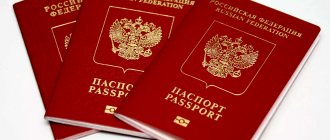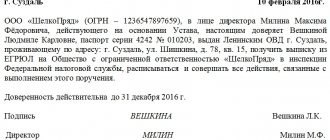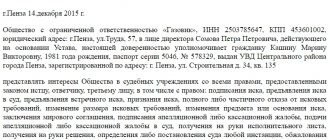What is a power of attorney
A power of attorney is a document with which you can authorize someone to perform legally significant actions.
A power of attorney is a written authority issued by one person to another person or other persons for representation before third parties.
Article 185 of the Civil Code of the Russian Federation
The one who issues the power of attorney is the principal or the principal. They can be a fully capable individual or a legally capable legal entity (several persons).
On behalf of young children, a power of attorney is drawn up by parents (legal representatives). Teenagers from 14 to 18 years old can draw up a power of attorney themselves, but within the limits of the competencies vested in them at that age.
The person to whom it is issued is a trustee or representative. This can be any adult, capable citizen(s), as well as an officially registered company(s).
The issuance of a power of attorney is a one-sided transaction. The consent of the representative is not required to carry it out. But he may not accept the power of attorney and refuse it at any time.
The actions of a representative are always actions on behalf of the principal, but in relation to third parties. He cannot make a transaction in his favor or in favor of his other principals.
Conditions for termination of the trust agreement
- Refusal of one of the parties from the transaction;
- If the Principal or the Attorney is declared incompetent;
- In case of liquidation of a legal entity (if a company or organization acted as one of the parties to the agreement), or due to the death of the Principal or Attorney;
- Upon completion of the contract period.
If the agreement to transfer affairs is terminated before the expiration date of the contract, then the law provides for the following consequences:
- The Principal is obliged to pay all expenses of his Attorney that arose in connection with the latter’s execution of the order;
- Denunciation of an agency agreement (or a power of attorney received on the basis of a similar agreement) by the Principal will not be the basis for compensating the attorney for losses resulting from the cancellation of the agreement;
- Termination of the contract (power of attorney) by the Attorney will also not be the basis for repaying the Principal for losses arising due to this.
Duration of power of attorney
When drawing up a power of attorney, the most important detail is the date.
A power of attorney that does not indicate the date of its execution is void.
Article 186 of the Civil Code of the Russian Federation
Without a date, it is impossible to calculate the validity period of a power of attorney. Previously, a power of attorney could be issued for a maximum of three years. This restriction has now been lifted.
If the text does not indicate the validity period of the power of attorney, then by default it remains valid for a year (Article 186 of the Civil Code of the Russian Federation).
Rights and obligations of the parties to the agreement
What you need to pay attention to when compiling:
- The ability for the authorized person to deviate from the content of the order if it is in the interests of the principal - this may be useful if the attorney was unable to contact the principal on time;
- The ability to transfer execution to a third party - usually this person is also specified in the trust agreement;
- Mandatory report from the attorney on the progress of the assignment;
- Upon termination of the contract, the Attorney undertakes to return the documents (power of attorney) to the Principal, even if their term has not yet expired;
- The principal is obliged to give the attorney a power of attorney to perform legal actions;
- Reimbursement of expenses incurred during the execution of the order falls entirely on the Principal, etc.
In addition to these clauses, it is strongly recommended that the agreement include a clause on the liability of the parties in case of failure to fulfill the terms of the contract or their performance in an inadequate volume/quality.
General rules for drawing up powers of attorney
A power of attorney is always a written document. For some, unified forms have even been developed. For example, for a power of attorney to receive material assets. In other cases, the power of attorney is simply written by hand or printed on a computer.
There are three required details.
- Date of preparation. As already noted, without it it is impossible to establish the validity period of the power of attorney. It can be indicated in the text by number or, as notaries do, in words.
- Information about the principal and representative. If a power of attorney is made between individuals, this information is usually limited to full name, dates of birth and passport details. But the absence or incompleteness of the latter is not grounds for invalidity of the power of attorney.
- Signature of the principal. A power of attorney is void without the signature of the person who issued it. If a person, due to a physical disability or illiteracy, cannot sign himself, they resort to the services of a hand-appler. For legal entities, a seal is also required.
Additional information that can be specified in the power of attorney:
- Place of compilation.
- The period for which it is issued.
- Powers of the representative.
Although it is not necessary to disclose in detail the powers of the representative, it is highly desirable. This can save you from litigation in the future. Especially if you delegate manipulations with your property to someone.
Do not hesitate to describe in detail the subject of the transaction (area, cadastral number, address, etc.) and give the representative specific instructions (for example, sell the apartment for an amount not lower than such and such).
You can also go the opposite way and limit the representative to a set of transactions that he can make (for example, any except for a pledge), or set a limit on the transaction amount (for example, if the contract exceeds a million rubles, the representative will not be able to conclude it by proxy).
Approximate contents of a power of attorney for the sale, rental and other actions with the apartment
Now let's look at the approximate structure of a notarized power of attorney and its content.
- At the very top, the name of the document (“Power of Attorney”), the place of its issue and the date are indicated. By the way, the date of issue of the power of attorney is a prerequisite for its validity.
- This is followed by the surname, name and patronymic of the principal, indication of citizenship, date and place of birth, his full passport data, information about the authority that issued the document, and address of residence. This is followed by information about your real estate. For example, the address of the location of the apartment, its area, number and date of issue of the certificate of ownership, the basis for acquiring the right.
- Similar information about the trustee is provided below. It is important to say that one power of attorney may indicate several representatives. In this case, everyone can be granted both an individual scope of rights and all the rights specified in the power of attorney.
- The following is information about the order that you trust to be carried out on your behalf. In our case, this means carrying out any transactions with the specified real estate, including alienation by any method not prohibited by law and rental. To do this, the representative is delegated the authority to submit and receive any documents, including certificates, extracts, statements, explanations, and sign all documents necessary for the proper execution of the specified order. As well as representing your interests in all state and non-state bodies or before individuals on issues related to the assignment.
- The following are indicated: the validity period of the power of attorney, an indication of the possibility of reassignment (or the lack of such a possibility), and you confirm that the consequences of issuing the power of attorney and the provisions of the law on powers of attorney have been explained to you. Then the personal signature of the person who issued the power of attorney is affixed.
- After all of the above, the notary’s details are indicated and his personal signature is affixed. With his signature, the notary confirms that the power of attorney was made in his presence, he verified your identity and legal capacity. The number of the power of attorney in the register and information about the amount collected for services are also indicated.
What are powers of attorney?
Depending on the scope of the representative’s powers, lawyers distinguish three types of powers of attorney.
- One-time. Issued to perform one specific action. For example, for the sale of land.
- Special. Issued to perform a number of similar actions within a certain time. An example is a power of attorney to represent interests in court.
- General (general). Issued for performing various actions, including the acquisition or alienation of property and signing documents. Such powers of attorney, for example, are received from the company by the heads of its branches.
Agency agreement and power of attorney - is there a difference?
In conversations you can often hear “I gave power of attorney to conduct business,” but this is not an entirely accurate wording. What is the difference between a power of attorney and an agency agreement:
- The Agency Agreement coordinates the legal relationship between the Principal and the Attorney;
- A power of attorney is issued on the basis of an agency agreement. In fact, a power of attorney simply confirms the authority of the authorized person before third parties, i.e., a power of attorney cannot replace an agreement of authority, but simply confirms that this document has been accepted and signed.
The main condition of the agreement (or the power of attorney issued on its basis) is the very essence of the assignment - it is necessary that all legal actions that need (or can) be carried out by the attorney are strictly and correctly prescribed.
Powers of attorney can be divided into groups:
- One-time - those that give the Attorney the right to carry out only one legal action;
- Special - these are concluded for a certain time period, during which the Principal transfers his rights to carry out any activity to the Attorney;
- General (general) - allows the trustee to perform arbitrary actions that do not contradict the law.
Material on the topic Addition to the statement of claim to the court, structure and sample
Power of attorney
Powers of attorney are also divided into simple written and notarized. By law, powers of attorney for transactions requiring a notarial form and state registration must be notarized (Article 185.1 of the Civil Code of the Russian Federation). For example:
- Contract for the purchase and sale of real estate.
- Mortgage agreement.
- Pledge agreement.
- Marriage contract.
- Agreement on payment of alimony and so on.
If the transaction does not require the intervention of a notary, then powers can be transferred using a regular power of attorney, written by hand. Therefore, if, for example, you are required to provide a notarized power of attorney so that your grandmother can pick up your child from kindergarten, this is illegal.
There are also categories of powers of attorney that are equivalent to notarial ones. For example, issued to the military and certified by the leadership of the military unit. A complete list of such powers of attorney is specified in Article 185.1 of the Civil Code of the Russian Federation.
You can easily find a sample power of attorney of any type on the Internet. There are even designers of powers of attorney.
Let's consider the features of compiling the most typical ones.
How to issue a power of attorney for a child
This power of attorney (or rather, consent to travel) will be needed if you plan to send your children to the sea with their grandparents.
Formally, such a document is required only in case of a trip abroad.
If a minor citizen of the Russian Federation leaves the Russian Federation unaccompanied by parents, adoptive parents, guardians or trustees, he must have with him, in addition to his passport, a notarized consent of the named persons for the departure of the minor citizen of the Russian Federation, indicating the period of departure and the state (states) ) which he intends to visit.
Article 20 of the Federal Law of August 15, 1996 No. 114-FZ “On the procedure for leaving the Russian Federation and entering the Russian Federation”
But in practice, such permission is often requested on trains and airports, even when traveling around Russia.
The power of attorney for traveling with a child must indicate the names and passport details of the parents and accompanying persons, as well as the full name and date of birth of the minor and the number of his identity document (birth certificate or passport). You can write where and for how long the child is going. Well, don’t forget about two other mandatory details: the date of execution of the power of attorney and the signature of the principal.
Let's appeal the refusal
So, in a situation where, on the date of sending the declaration under the TCS, the representative’s power of attorney was still valid, but on the date of generation of the Federal Tax Service Inspectorate there was no longer a receipt for acceptance, there are no legal grounds for refusing to accept the declaration. After all, the authority of the representative is duly confirmed. And the basis for refusal to accept a declaration is precisely the absence of documents that, in the prescribed manner, confirm the corresponding powers of the representative (clause 2, clause 28 of the Administrative Regulations for the acceptance of tax returns, approved by order of the Ministry of Finance of Russia dated July 2, 2012 No. 99n)).
In the case described, such documents are available. And on the date of each action, determined according to the rules established by tax legislation, the term of office of the representative has not yet expired.
So the refusal to accept the declaration in the situation under consideration is illegal. It violates not only the provisions of the Administrative Regulations, which provide an exhaustive list of cases when refusal is possible, but also paragraph 4 of Art. The Tax Code of the Russian Federation, which establishes a ban on refusal to accept a declaration if it is drawn up in the approved form. This means that such a refusal can and should be appealed. First, to a higher tax authority (the complaint is submitted through the Federal Tax Service, which refused to accept the declaration). And if this does not help, then go to court (Articles 137 and 138 of the Tax Code of the Russian Federation). An example complaint form is given below.
How to issue a power of attorney for a car
Powers of attorney to drive a car were abolished in 2012. Now the driver simply signs up for insurance. And traffic police officers should not require other documents certifying the right to use the vehicle.
This is true when it comes purely to driving a car. But there are cases when you cannot do without a power of attorney.
Without a power of attorney, you cannot pick up a car from the impound lot, get a duplicate license plate, deregister it, issue compulsory motor liability insurance and undergo a technical inspection.
In addition, to travel abroad, you need a notarized power of attorney with a direct indication that the representative can leave the Russian Federation in this car.
When drawing up a power of attorney for a car, in addition to the usual details, it is recommended to indicate the make and model of the car, its year of manufacture, identification number, and PTS data.
How to issue a power of attorney to a bank
It is impossible to carry out many banking transactions without the signature of the client or his authorized representative. But this does not mean that in order to entrust your banking affairs to someone, you need to go to a notary.
The law allows you to issue a power of attorney to carry out banking transactions directly at a branch of a credit institution. To do this, you need to come to your bank with your passport and ask for a form to draw up a power of attorney (as a rule, each bank has its own form of this document).
In addition to the required details, it is recommended that the text of the power of attorney indicate exactly what operations the representative can perform. For example, replenish a deposit, use a safe deposit box, or make transactions on an account in an amount not exceeding 100,000 rubles.
Written authorization for a representative of a citizen to receive his deposit in a bank, to deposit funds into his deposit account, to carry out transactions on his bank account, including receiving funds from his bank account, as well as to receive correspondence addressed to him in a communications organization may be presented directly to the bank or telecommunications organization.
Part 3 of Article 185 of the Civil Code of the Russian Federation
According to this norm, the same rules apply to postal correspondence. Read more about how to issue a power of attorney for Russian Post here.
Powers of attorney
In accordance with paragraph 1 of Article 185 of the Civil Code of the Russian Federation (hereinafter referred to as the Civil Code of the Russian Federation), a power of attorney is recognized as a written authority issued by one person (represented) to another person (representative) for representation before third parties.
Represented persons can be both individuals and legal entities who can issue powers of attorney within the limits of their rights and obligations.
Represented individuals have the right to issue powers of attorney if they have full legal capacity (persons who have reached the age of 18 have full legal capacity), as well as minors aged 14 to 18 years who have acquired full legal capacity in the cases provided for in Article 21 and Article 27 of the Civil Code of the Russian Federation (upon marriage and in the event of divorce before the age of 18, when a minor is declared fully capable in the prescribed manner by a decision of the guardianship and trusteeship body or a court decision).
Minors aged 14 to 18 years, who do not have full legal capacity, can also issue powers of attorney, but only within the limits of their rights to make transactions.
In particular, notarization of a power of attorney for minors from 14 to 18 years of age can be carried out in relation to the transfer of powers that they can exercise independently (clause 2 of Article 26 of the Civil Code of the Russian Federation). To transfer powers to carry out transactions provided for in paragraph 1 of Article 26 of the Civil Code of the Russian Federation, a power of attorney can be certified only with the written consent of their legal representatives: parents, adoptive parents or trustees.
Powers of attorney on behalf of minors (Article 28 of the Civil Code of the Russian Federation) and on behalf of incapacitated citizens (Article 29 of the Civil Code of the Russian Federation) are issued by their legal representatives.
Written authority to carry out a transaction by a representative may be presented by the represented directly to the relevant third party, who has the right to verify the identity of the represented and make a note about this on the document confirming the authority of the representative.
Written authorization for a representative of a citizen to receive his deposit in a bank, to deposit funds into his deposit account, to carry out transactions on his bank account, including receiving funds from his bank account, as well as to receive correspondence addressed to him in a communications organization may be presented directly to the bank or telecommunications organization.
The rules of the Civil Code of the Russian Federation on power of attorney also apply in cases where the powers of the representative are contained in an agreement, including in an agreement between the representative and the represented, between the represented and a third party, or in a decision of the meeting, unless otherwise established by law or does not contradict the essence of the relationship.
If a power of attorney is issued to several representatives, each of them has the powers specified in the power of attorney, unless the power of attorney stipulates that the representatives exercise them jointly.
The rules of Article 185 of the Civil Code of the Russian Federation accordingly also apply in cases where a power of attorney is issued jointly by several persons.
According to Article 185.1 of the Civil Code of the Russian Federation, a power of attorney to carry out transactions requiring a notarial form, to submit applications for state registration of rights or transactions, as well as to dispose of rights registered in state registers must be notarized, except for cases provided for by law.
In accordance with paragraph 2 of Article 163 of the Civil Code of the Russian Federation, transactions are subject to mandatory notarization:
- in cases specified in the law;
- in cases provided for by agreement of the parties.
The following are equivalent to notarized powers of attorney:
1) powers of attorney of military personnel and other persons undergoing treatment in hospitals, sanatoriums and other military medical institutions, which are certified by the head of such an institution, his deputy for medical affairs, and in their absence, the senior or duty doctor;
2) powers of attorney of military personnel, and at points of deployment of military units, formations, institutions and military educational institutions, where there are no notary offices and other bodies performing notarial acts, also powers of attorney of employees, members of their families and family members of military personnel, which are certified by the commander (chief ) these units, formations, institutions or establishments;
3) powers of attorney of persons in places of deprivation of liberty, which are certified by the head of the corresponding place of deprivation of liberty;
4) powers of attorney of adult capable citizens located in social protection institutions, which are certified by the administration of this institution or the head (his deputy) of the relevant social protection authority.
A power of attorney to receive wages and other payments related to labor relations, to receive remuneration for authors and inventors, pensions, benefits and scholarships, or to receive correspondence, with the exception of valuable correspondence, can be certified by the organization in which the principal works or studies, and by the administration inpatient medical institution where he is being treated. Such a power of attorney is certified free of charge. Substitution in these cases is not permitted.
A power of attorney on behalf of a legal entity is issued signed by its head or another person authorized to do so in accordance with the law and constituent documents.
When performing a notarial act to certify a power of attorney, the notary must comply with the basic rules for performing notarial acts provided for by Chapter IX of the Fundamentals of the Legislation of the Russian Federation on Notaries (hereinafter referred to as the Fundamentals).
Before performing a notarial act, the notary establishes the identity of the person applying for the notarial act, checks the legal capacity of the citizen and the legal capacity of the legal entity, the powers of the representative of the legal entity in accordance with the constituent documents.
The identity of Russian citizens is established by a passport or other identity document that replaces a passport. The identity of Russian citizens permanently residing abroad and arriving in the Russian Federation for temporary residence is established using their general foreign passports.
The identity of foreign citizens living on the territory of the Russian Federation is established by passport (Article 10 of the Federal Law “On the Legal Status of Foreign Citizens in the Russian Federation”), as well as by another document established by federal law or recognized by an international treaty.
The notary also explains to the person applying for a power of attorney the legal consequences of issuing a power of attorney so that legal ignorance cannot be used to harm.
From January 1, 2021, information about notarized powers of attorney, in particular about the person who certified the power of attorney, the date of certification of the power of attorney, its registration number in the register of notarial actions of the UIS, the date and time of entering information about the cancellation, will be added to the notary's unified information system (EIS). power of attorney, if the power of attorney is revoked, free and direct access to an unlimited number of persons will be provided without charging a fee using the Internet information and telecommunications network every day and around the clock.
If the power of attorney does not indicate the period of its validity, it remains valid for a year from the date of its execution; a power of attorney that does not indicate the date of its execution is void.
A power of attorney certified by a notary, intended for performing actions abroad and not containing an indication of its validity period, remains valid until it is canceled by the person who issued the power of attorney.
The person to whom the power of attorney has been issued, according to Article 187 of the Civil Code of the Russian Federation, must personally perform those actions for which he is authorized. It can entrust their execution to another person if it is authorized to do so by a power of attorney, and also if it is forced to do so by force of circumstances to protect the interests of the person who issued the power of attorney and the power of attorney does not prohibit the entrustment.
A person who has delegated powers to another person must notify the person who issued the power of attorney about this within a reasonable time and provide him with the necessary information about the person to whom the powers have been transferred. Failure to fulfill this obligation makes the person who delegated the authority responsible for the actions of the person to whom he delegated the authority as if it were his own.
A power of attorney issued by way of delegation must be notarized.
The rule on notarization of a power of attorney issued by way of delegation does not apply to powers of attorney issued by way of delegation by legal entities, heads of branches and representative offices of legal entities.
The validity period of a power of attorney issued by way of subpoenaing cannot exceed the validity period of the power of attorney on the basis of which it was issued.
Unless otherwise specified in the power of attorney or established by law, a representative who has delegated powers to another person by way of delegation does not lose the corresponding powers.
The transfer of powers by a person who has received these powers as a result of a delegation to another person (subsequent transfer) is not allowed, unless otherwise provided in the initial power of attorney or established by law.
The grounds for termination of a power of attorney are established in Article 188 of the Civil Code of the Russian Federation. The power of attorney is terminated due to:
1) expiration of the power of attorney;
2) cancellation of the power of attorney by the person who issued it, or by one of the persons who issued the power of attorney jointly;
3) refusal of the person to whom the power of attorney was issued renounces his powers;
4) termination of the legal entity on whose behalf or to whom the power of attorney was issued, including as a result of its reorganization in the form of division, merger or merger with another legal entity;
5) death of the citizen who issued the power of attorney, recognition of him as incompetent, partially capable or missing;
6) death of a citizen to whom a power of attorney was issued, recognition of him as incompetent, partially capable or missing;
7) the introduction of a bankruptcy procedure in relation to the represented or representative, in which the corresponding person loses the right to independently issue powers of attorney.
The person to whom the power of attorney has been issued may at any time renounce the authority, and the person who issued the power of attorney may cancel the power of attorney or subassignment, with the exception of the case provided for in Article 188.1 of the Civil Code of the Russian Federation (irrevocable power of attorney). An agreement to waive these rights is void.
With the termination of the power of attorney, the sub-authority loses its force. At the same time, if a third party is presented with a power of attorney issued by way of delegation, about the termination of which he did not know and should not have known, the rights and obligations acquired as a result of the actions of the person whose powers were terminated remain valid for the represented person and his legal successors in accordance with with paragraph 2 of Article 189 of the Civil Code of the Russian Federation.
A person who issued a power of attorney and subsequently canceled it is obliged to notify the person to whom the power of attorney was issued, as well as third parties known to him, for whose representation the power of attorney was given, about the cancellation. The same obligation is assigned to the legal successors of the person who issued the power of attorney in cases of its termination on the grounds provided for in subparagraphs 4 and 5 of paragraph 1 of Article 188 of the Civil Code of the Russian Federation.
Today, the cancellation of a power of attorney can be published in an official publication in which information about bankruptcy is published. In this case, the signature on the application to revoke the power of attorney must be notarized. Third parties are considered to be notified of the revocation of the power of attorney after a month from the date of said publication, unless they were notified of the revocation of the power of attorney earlier.
From January 1, 2021, changes to Articles 188, 189 of the Civil Code of the Russian Federation, introduced by Federal Law dated July 3, 2016 No. 332-FZ “On Amendments to Articles 188 and 189 of Part One of the Civil Code of the Russian Federation and to the Fundamentals of the Legislation of the Russian Federation on notary” concerning the cancellation of the power of attorney and the communication of information about its cancellation.
In particular, the cancellation of a power of attorney by the person who issued it, or by one of the persons who issued the power of attorney jointly, must be done in the same form in which the power of attorney was issued, or in notarial form (subparagraph 2 of paragraph 1 of Article 188 of the Civil Code of the Russian Federation as amended by the Federal Law dated 07/03/2016 No. 332-FZ).
Information about the cancellation of a power of attorney completed in a notarized form after it has been entered by a notary into the register of notarial actions of the UIS, which is maintained in electronic form, will be available to an unlimited number of persons using the Internet information and telecommunications network.
Information about the cancellation of a power of attorney completed in simple written form may be published in the official publication in which information about bankruptcy is published. In this case, the signature on the application to revoke the power of attorney must be notarized.
Moreover, from January 1, 2021, if third parties were not notified of the cancellation of the power of attorney earlier, they are considered to have been notified of the cancellation of the power of attorney completed in notarial form on the next day after entering information about this in the register of notarial actions, and of the cancellation made in simple written form power of attorney - after one month from the date of publication of such information in the official publication in which information about bankruptcy is published.
For certification of powers of attorney for which the legislation of the Russian Federation provides for a mandatory notarial form (powers of attorney for transactions (transactions) requiring (requiring) a notarial form in accordance with the legislation of the Russian Federation; powers of attorney issued in the order of delegation (if such certification is required in accordance with the legislation Russian Federation); other powers of attorney), a notary in accordance with Article 333.24 of the Tax Code of the Russian Federation charges a tariff of 200 rubles.
For certification of powers of attorney, the notarized form of which is not required in accordance with the legislation of the Russian Federation, the notary charges a fee on the basis of subclause 6 of clause 1 of Article 22.1 of the Fundamentals, which is also 200 rubles.
In addition to the notary fee, when certifying a power of attorney, the notary is given the right to charge fees for the provision of legal and technical services.
the ability of a citizen, through his actions, to acquire and exercise civil rights, create civil responsibilities for himself and fulfill them. The capacity and legal capacity of a citizen are mandatory for his participation in civil legal relations. Legal capacity arises in full upon reaching the age of majority – 18 years. Until a person reaches the age of eighteen, legal capacity is acquired through marriage and emancipation. union of a man and a woman registered with the civil registry office. Unregistered de facto marital relations (civil marriage) do not give rise to legal consequences - that is, the rights and obligations of spouses in accordance with the Family Code of the Russian Federation, just like a marriage concluded according to a religious rite. Registration is carried out only in the personal presence of those entering into marriage; representation in this case is not allowed. Verification of the legality of the transaction, including whether each party has the right to complete it. Carried out by a notary or an official who has the right to perform such a notarial act, in the manner determined by the Fundamentals of the legislation of the Russian Federation on notaries and civil legislation. written authority granted by one person to another person to enter into a transaction with a third party; a person on whose behalf a power of attorney is made; an official authorized by the state who has the right to perform notarial acts on behalf of the Russian Federation in the interests of Russian citizens and organizations (legal entities); enshrined in law the ability of a person to have legal rights and bear legal obligations, which is recognized equally to all citizens. The legal capacity of a citizen arises at the moment of his birth and ends with death. a high-tech automated information system that supports the activities of notaries in the Russian Federation. Allows notaries to use all the advantages of electronic document management, receive up-to-date data, quickly check the necessary information, create databases available online to citizens, businesses and government agencies. Persons defending their rights and interests protected by law in a civil dispute. Third parties are not the initiators of the claim; it is initiated by the parties. In this connection, a distinction is made between third parties who make independent claims on the subject of the dispute and those who do not make such claims. Third parties filing independent claims enter into the initiated civil process, bringing a claim on a general basis against both parties to the process or against one of them. Third parties who do not file independent claims enter into civil proceedings on the side of the plaintiff or defendant if the decision in the case may affect their rights or obligations.
How to issue a power of attorney to receive a pension
Article 185.1 of the Civil Code of the Russian Federation states: “A power of attorney to receive a salary or other payments resulting from an employment relationship (pensions, bonuses, royalties) can be certified by the head of the institution where the person works.”
In other words, if you officially work in an organization and are planning to leave somewhere, you can approach management and ask to certify a power of attorney to receive a salary or pension.
Everything is a little more complicated when we are talking about the so-called non-working pensioners and incapacitated people receiving a social pension.
In the first case, according to the norms of the Civil Code and Federal Law No. 173 “On Labor Pensions in the Russian Federation,” the power of attorney will have to be notarized. In the second, the power of attorney is issued through the local branch of the Pension Fund.
Housing and communal organizations, post offices and banks cannot certify powers of attorney for receiving pensions.
A power of attorney to receive a pension can only be endorsed in a medical, social or correctional institution if the person is permanently staying there.










